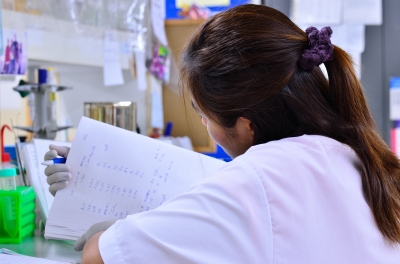
Then Moses said to the Israelites, “See, the Lord has chosen Bezalel son of Uri, the son of Hur, of the tribe of Judah, and he has filled him with the Spirit of God, with wisdom, with understanding, with knowledge and with all kinds of skills—to make artistic designs for work in gold, silver and bronze, to cut and set stones, to work in wood and to engage in all kinds of artistic crafts. And he has given both him and Oholiab son of Ahisamak, of the tribe of Dan, the ability to teach others.” – Exodus 35:30-34 (NIV)
Reflection
God delights in making things. We see this in the goodness of creation in Genesis 1 and also in God’s boasting of his creativity and sovereignty in Job 38-41. But Scripture does not limit creativity to God. The Lord invites us to be creative and imaginative, too. God invited people to name the animals in Genesis 2, to wonder (in awe of God’s power) about how the world works in Job 38-41, and to build the tabernacle in Exodus 31-40 so that God would dwell among them.
In the case of Bezalel and Oholiab, God gave them special gifts of creative craftsmanship for the task of building the tabernacle. The structures I build are of a vastly smaller scale: molecular architectures. Despite my more modest goals, I often do feel that God has given me some measure of wisdom, understanding, knowledge, and skill to make things.
Each molecule that my students and I make—indeed, every one that we even imagine making—causes me to delight in God’s gift of creativity. Of course, the most exciting compounds to make are those that have been our goal for a year or more, substances found in nature that have medicinal value. We rejoiced when we produced a synthetic sample of antifungal davanone and saw that its spectral properties exactly matched those of the natural, plant-derived compound! It is truly a privilege to share powerful experiences like this with my students, seeing their eyes light up with joy.
Whether chemists or not, we can use our creativity to reflect God’s image as creator. J. R. R. Tolkien calls our creative acts sub-creation, as illustrated in this excerpt from his creation story of Middle-earth:
Yet the making of things is in my heart from my own making by thee; and the child of little understanding that makes a play of the deeds of his father may do so without any thought of mockery, but because he is the son of his father. (Tolkien, J. R. R. The Silmarillion, Boston: Houghton Mifflin, 1977, p. 43)
Our ability to create comes from God’s own creativity. I rejoice in the gift of creativity along with Tolkien. When we use our creativity for good, God delights in it. And that is our goal, as Christian scholars, to bring God glory through all we do—teaching, researching, serving, and creating.
Questions
In what creative acts as a scholar or teacher do you delight?
How can you seek God’s delight in your creativity?
Prayer
Lord, may your glory increase! May you delight in all you have made. Help our creativity and imagination to delight you, and help us to delight in it. Help us to love others, to care for your world, and to be ambassadors of hope in our academic communities and in all of our lives. May the grace of our Lord Jesus Christ be with us. Amen.
Further Reading
Crouch, Andy. Culture Making: Recovering Our Creative Calling. Downer’s Grove: InterVarsity Press, 2008.
Tolkien, J. R. R. “On Fairy-Stories.” The Tolkien Reader. 3-84. New York: Ballantine Books, 1966.
Tolkien, J. R. R. The Silmarillion, Boston: Houghton Mifflin, 1977.
David Vosburg is a Professor of Chemistry at Harvey Mudd College in Claremont, California. He has a PhD in chemistry from The Scripps Research Institute and was a postdoctoral fellow at Harvard Medical School. His research involves the synthesis of medicinal natural products and molecular containers using environmentally friendly and/or biomimetic methods. David is a Fellow of the American Scientific Affiliation, a Henry Dreyfus Teacher-Scholar, and an Associate of the Faraday Institute for Science and Religion. He and his wife Kate (a campus minister) recently published Jesus, Beginnings, and Science: A Guide for Group Conversation, which is specifically aimed at facilitating the positive conversations recommended above.

Leave a Reply